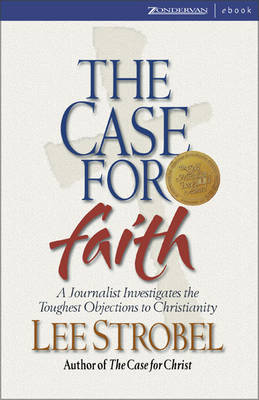Reviewed by empressbrooke on
These books were given to me by a guy I was dating at the time who decided I'd only be an acceptable wife if I converted to Christianity (I'm currently single, if you're wondering how well that went over). It's a shame he chose these books as his main plan of attack, because they're terrible.
Lee Strobel's first mistake is that he tries to answer everything with a pat, definitive response. The tone he uses is one that says, "AH! This is so simple, now that you've explained it! How does anyone not understand?" As most people realize, religion is complicated and often requires you to just believe in things that you take on faith, rather than because it's been proven by evidence. Trying to argue for faith makes faith a moot point.
When answering the question, "If there's a God, why does he allow such suffering in this world?" Strobel trots out the tired response, "Because God gave us free will." For a book that's supposed to help convert people, that answer isn't going to reassure someone who had strong objections in the first place. It also fails to acknowledge that we really just don't know, and that we tell ourselves this to try to make sense of things, not because we know for sure.
Strobel also tried to address deep questions with anecdotes - one that sticks out in my mind to this day was a response to a question about how people who never heard of Jesus could be saved, and isn't it a flaw of the religion if it only applied to people who happened to live in a place where Jesus was brought to their attention? Strobel somehow thought that a story about a Muslim girl in a Muslim country who one day randomly thought "I need Jesus's help" and secretly became Christian answered it sufficiently and proved that we will just know Jesus in our hearts.
Other answers required a preexisting belief in order to make sense. They reminded me of the circular argument the aforementioned ex-boyfriend would give for Jesus's divinity - Jesus is God, so since he says he's God, if I don't believe he's God, I'm calling God a liar.
The kicker for me was a chapter about the prediction of the Messiah in the Jewish bible - Strobel managed to find an ignorant Jew who must have never done even the minimal Torah study. With his help, Strobel spins a conspiracy where Rabbis hide the fact that the Jewish bible prophesied the arrival of the Messiah. The ignorant Jew tells Strobel all about how he didn't know such a thing was foretold, and it was such a revelation to him that he converted to Christianity. I want to find this guy and smack him up the side of the head with my Tanakh and suggest he look up that little thing about the descendant of King David.
Strobel would have done far better to admit that these are complicated questions for which we don't have all the answers, if we have any at all. The fact that he has an answer for everything just makes him look silly and arrogant. If religion were this easy, we wouldn't have the Talmud and Midrash.
Reading updates
- Started reading
- 1 November, 2003: Finished reading
- 1 November, 2003: Reviewed
